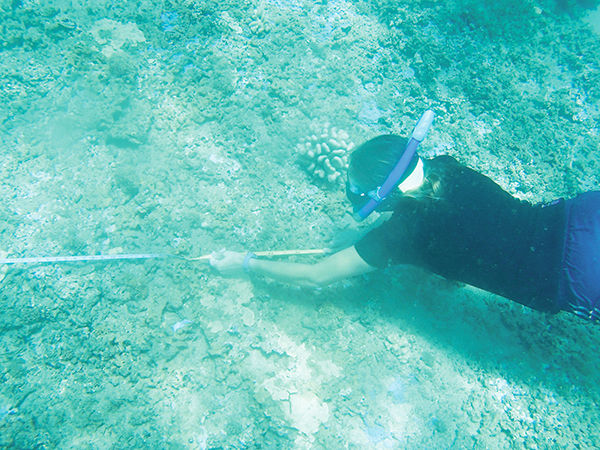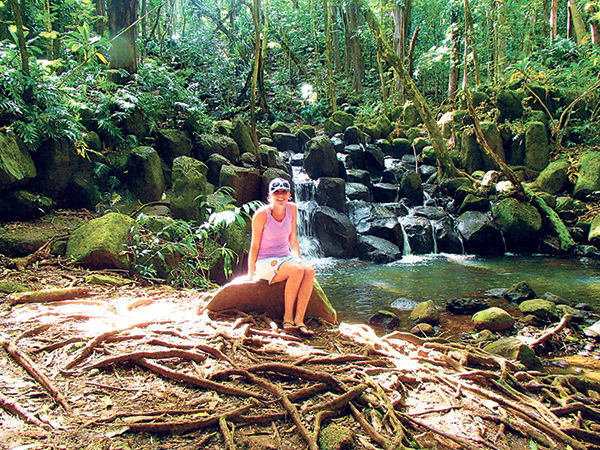A New Jersey native, Katie Nalesere eventually found a second home — and husband — in the South Pacific island nation of Vanuatu. Today, however, she lives on Kauai and spends her days educating the public about Hawaii’s unique marine
A New Jersey native, Katie Nalesere eventually found a second home — and husband — in the South Pacific island nation of Vanuatu. Today, however, she lives on Kauai and spends her days educating the public about Hawaii’s unique marine resources.
Nalesere was hired last year as education specialist for the Division of Aquatic Resources, Department of Land and Natural Resources. She brought with her years of experience in environmental education and expert knowledge of coral reefs and other marine life.
Earlier this month, she led a lecture on the state’s response and investigation of a coral disease outbreak no Kauai’s North Shore, as well as a workshop in which participants learned about the important role coral plays in reef ecosystems and created their own coral colonies using clay.
The Garden Island caught up with Nalesere to discuss how she’s settling into her new position and home, the challenges she faces and how each of us can do more to manage, conserve and restore our aquatic resources.
The Garden Island: First, tell us a little bit about your background? Where are you from? How did you find yourself living on the Garden Isle?
Katie Nalesere: I grew up in the Garden State of New Jersey, pretty different from the Garden Isle. Serving in the Peace Corps had always been my dream, so I joined immediately after completing college. Peace Corps assigned me to Vanuatu as a marine resource management volunteer. After spending my first year working with a community on a small island teaching environmental education and assisting a fisheries stock enhancement project, I was transferred to work with the national fisheries department and coordinate the Reef Check Vanuatu, a community-based coral reef monitoring program. I spent five years running the program and training local communities to monitor their own reefs and community conservation areas. After seven years in Vanuatu, I felt like it was time to gain some new experience, so I applied for the job on Kauai.
TGI: What are your duties as education specialist for DLNR’s Division of Aquatic Resources?
KN: I am responsible for conducting informational and educational activities about Hawaii’s freshwater and marine resources, including: Aquatic life forms in Hawaii, how to identify them, and their biological requirements and habitat characteristics; Hawaii’s fishing rules and regulations; Conservation ethics and responsible use of aquatic resources and habitats, and; Fishing methods and fishing safety practices.
I also serve as a liaison between the public and the state’s aquatic resources program.
TGI: Have you found the position rewarding so far?
KN: Definitely! So far I have been lucky to work with several schools and camp programs. Working with the island’s youth is refreshing. Seeing their interest, enthusiasm and energy keeps me positive about the future.
TGI: What are some of the biggest challenges you face in your day-to-day work?
KN: My biggest challenge is developing programs and materials which not only teach about our aquatic resources but make people feel motivated and empowered to care for our resources. It was best explained to me by a community member on the North Shore. He said that our marine resources are like a garden. We need to put in the time and energy to care and nurture the resource before we can reap the benefits. My goal and my challenge is to help people feel able to take on that role.
TGI: There is no denying Kauai is a special place. What do you find most amazing about the island?
KN: I love the mountains! Before discovering the underwater world, I was a mountain girl. I love hiking, camping and just being outside in the woods. On Kauai, you not only get beautiful mountains and trails, but reefs and amazing aquatic environments is like having your cake and eating it too. That and just the natural beauty of the island make it an amazing place.
TGI: Do you have a favorite aquatic critter?
KN: Definitely Uhu, or Parrotfish. Not only are they beautiful and the first tropical fish I ever remember seeing, but they are so much fun to teach about. What other fish lives in harems, changes from female to male, and can poop up to a ton of sand a year! The last fact always gets the kids’ interest!
TGI: You have been a key member of the Kauai Management Response Team, which is working to address the outbreak of black band coral disease on the island. Can you talk a little bit about that team and what you guys are seeing out there on our reefs?
KN: The Kauai Management Response Team is a multi-agency, interdisciplinary group of experts that was convened following the initial assessment and confirmation of the black band disease outbreak on Kauai. KMRT’s role is to review incoming data, communicate findings to the public and assess effective management options to mitigate impact and/or promote recovery.
Currently, the team is looking at the information we have available and assessing what additional information and studies we need to begin moving towards management options. As education specialist, I primarily deal with finding ways to get information to the public about the disease and KMRT’s efforts.
TGI: What do you see as the biggest threats to managing, conserving and restoring Kauai’s aquatic resources and ecosystems?
KN: I think we can be our own biggest threat. Managing, conserving and restoring our aquatic resources is going to have to be a collaborative effort. We are going to have to team up across all levels of government, all sectors, and across all of our communities, including those living on the island and short-term visitors. If we can all come together and recognize the role we can each play in caring for our resources, I think we will be able to address current and future impacts to our aquatic ecosystems.
TGI: Can you tell us a bit more about your time in the Peace Corps? What’s Vanuatu like, for those of us who haven’t been fortunate enough to make a visit?
KN: Peace Corps was one of the best things I have ever done. I feel extremely fortunate to have been sent to Vanuatu. Vanuatu is a beautiful, remote Melanesian country located in the south west corner of the Pacific. Communities are still primarily subsistence farmers and are led by local chiefs. Vanuatu is most known for its friendly people, being recognized as the happiest country on earth, and strong kava. During my time in Vanuatu, I was accepted by and became a part of the community. Not only did I gain a new family, I gained a new home.
TGI: What is one thing most people don’t know about you and your work that you think they should?
KN: One little known thing about me is that I had my 15 minutes of fame when I was in Vanuatu. I got to act in one of the most popular string band music videos in Vanuatu at the time. I love the local music!
About my work, talks and activities are run by request. If anyone has a community group or school group that would like to have an educational program, all they have to do is come into our office or give a call and we can arrange one.
TGI: When not working, how do you like to spend your time on Kauai?
KN: I like to spend my free time exploring the island with my husband, who is from Vanuatu. We enjoy finding a new road to drive down, a new trail to hike, or a new reef to explore. It’s always an adventure! We like to end the day Vanuatu style with a shell of kava.



